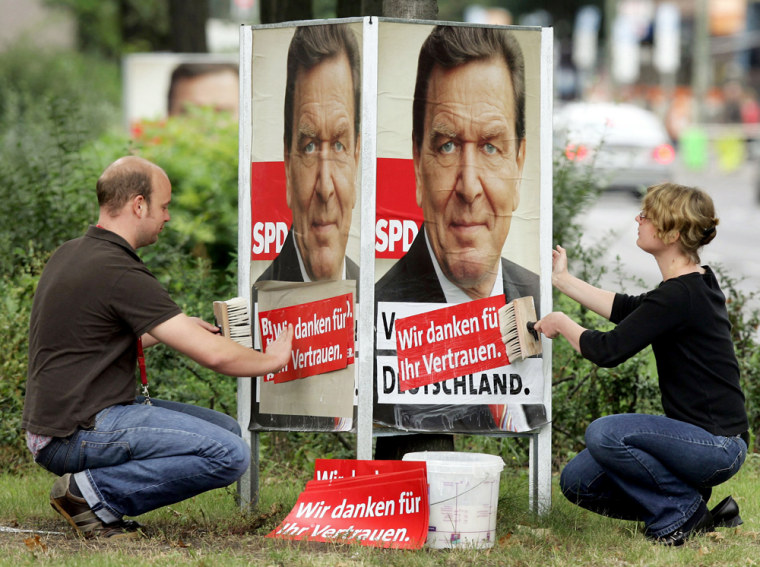Oops! What now, Deutschland?
Germans were confused and in shock on Monday morning after Sunday’s general election failed to give either of the major political parties a mandate, thus leaving the economically troubled country with no clear leader.
Even though Angela Merkel's conservative Christian Democrats (CDU) and their sister party, the Christian Social Union (CSU), emerged as a marginal winner — with 35.2 percent of the vote against 34.3 percent for Gerhard Schroeder’s Social Democrats (SPD) — the challenger cannot become the country's first-ever woman chancellor without entering into a complicated coalition, including the possibility of a "grand coalition" between the two major parties.
Schroeder, meanwhile, dismissed the idea that she ever will.
"Do you honestly believe that my party will enter talks with Mrs. Merkel if she says that she wants to become chancellor?" Schroeder said on Sunday night in a heated television interview.
Future unclear
The uncompromising post-election battle between Schroeder and Merkel is adding to fears of a political gridlock in Germany.
"Who will rule Germany now?" was one of the headlines on Germany's mass circulation Bild newspaper on Monday morning.
The ambivalent situation was reflected in reactions from other European countries, which are concerned at the prospect of instability in the continent’s most populous and economically powerful nation.
“The election results present an uncertain political picture," said Gianfranco Fini, Italy's foreign minister.
In Britain, the country's leading papers were harsh in their headlines and reports.
"Election setback for Germany's Thatcher brings chaos to Berlin,” was The Times’ headline.
"Within Europe, Germany wasn't exactly a leader for reform, nor a leader in anything, and that will just continue," Daniel Gros, from the Centre for European Studies, told The Times.
Experts in Germany shared the same worries.
"The new German government will neither be able to improve relations with the United States, nor will it be able to tackle key foreign policy issues in Europe," said Professor Manfred Wilke from the Free University in Berlin.
The situation also weighed heavily on financial markets, which before the election had hoped for a clean sweep by Merkel's conservatives and the middle-of-the-road Free Democrats (FDP), both of which had vowed deep economic reforms.
On Monday, the Euro fell over more than one percent to a seven-week low against the dollar, while German stocks shed 0.8 percent, with German utility and auto stocks were particularly hard hit.
"On balance, the only certainty is a period of uncertainty ahead," said economists at Credit Suisse First Boston.
New alliances in the cards?
The uncertainty has brought with it the prospect that that new alliances, to date unseen in German political history, could take effect.
Because the three smaller parties all performed strongly — with the FDP winning 9.8 percent, 8.1 percent for the Greens and 8.7 percent for the Left Party (the former communist party) — they have all emerged as key players in coalition talks.
The coalition of Schroeder's SPD and the Greens, who have been in charge for the past seven years, would be able to stay in power if they manage to bring the FDP into the boat.
For decades, the FDP has wielded power beyond its size due to its role as a parliamentary swing vote and has paired with both the CDU/CSU and the SDP in return for key policy moves and cabinet positions
However, Guido Westerwelle, head of the FDP party has categorically ruled out support for the SDP.
Another option would be what has been coined the "Jamaica" coalition: Merkel's conservatives, the FDP and the environmentalist Greens. (The three party’s colors match the black, yellow and green in the Jamaican flag.) Strong differences, though, with the Greens over immigration and environmental policies would make consensus extremely difficult.
Could ‘grand coalition’ be the answer?
Also touted is a "grand coalition" between Merkel’s CDU/CSU and Schroeder’s SPD. In fact, polls ahead of the election suggested that voters believed this would be the only alliance with enough clout to push through painful reforms on taxes, health care and outdated federal structures.
But analysts say that because of fundamental policy differences between the traditional rivals such a coalition could be fragile and further paralyze the country.
"The difficult political alliances and also strong gains for the former East German communist party (the Left Party), especially in western Germany, are dynamic factors for further stagnation," said Professor Wilke.
So now the spotlight moves away from the ballot box to the backrooms, where party leaders have to hammer out a deal before an Oct. 18 deadline for the new parliament to sit.
"The coming weeks will be the weeks of the Machiavellians and the grand strategists," Germany's Süddeutsche Zeitung wrote in an editorial.
And if that fails? Likely chaos — and unprecedented round of new elections.
